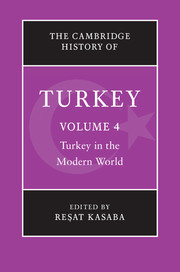Book contents
- Frontmatter
- 1 Introduction
- PART I OTTOMAN BACKGROUND AND TRANSITION
- PART II REPUBLIC OF TURKEY
- 7 Migration and Turkey: the dynamics of state, society and politics
- 8 The migration story of Turks in Germany: from the beginning to the end
- 9 Politics and political parties in Republican Turkey
- 10 Economic change in twentieth-century Turkey: is the glass more than half full?
- 11 Ideology, context and interest: the Turkish military
- 12 Kurds and the Turkish State
- 13 Islam and politics in contemporary Turkey
- 14 Sufism and Islamic groups in contemporary Turkey
- 15 Contestation and collaboration: women’s struggles for empowerment in Turkey
- 16 Art and architecture in modern Turkey: the Republican period
- 17 The novel in Turkish: narrative tradition to Nobel prize
- 18 A brief history of modern Istanbul
- Select bibliography
- Index
- References
14 - Sufism and Islamic groups in contemporary Turkey
from PART II - REPUBLIC OF TURKEY
Published online by Cambridge University Press: 28 November 2009
- Frontmatter
- 1 Introduction
- PART I OTTOMAN BACKGROUND AND TRANSITION
- PART II REPUBLIC OF TURKEY
- 7 Migration and Turkey: the dynamics of state, society and politics
- 8 The migration story of Turks in Germany: from the beginning to the end
- 9 Politics and political parties in Republican Turkey
- 10 Economic change in twentieth-century Turkey: is the glass more than half full?
- 11 Ideology, context and interest: the Turkish military
- 12 Kurds and the Turkish State
- 13 Islam and politics in contemporary Turkey
- 14 Sufism and Islamic groups in contemporary Turkey
- 15 Contestation and collaboration: women’s struggles for empowerment in Turkey
- 16 Art and architecture in modern Turkey: the Republican period
- 17 The novel in Turkish: narrative tradition to Nobel prize
- 18 A brief history of modern Istanbul
- Select bibliography
- Index
- References
Summary
Sufism, the mystical tradition of Islam, is based on the pursuit of spiritual truth by transcending (not necessarily refuting) Islamic law through ascetic and esoteric practices. Sufi orders believe that the Qu’ran has two levels of meaning: an outer (zahir) and an inner (batin) level. The outer level is accessible to all, but is less valuable, while the inner level is accessible only to initiated disciples of the mystical orders.
Each sufi order (tarikat) formulates a distinctive way of seeking divine love and truth, based on the teachings of a spiritual master, or şeyh. The mürid, or initiated member of a sufi order, forms a personal relationship with the şeyh, who assigns disciplinary practices of asceticism, self-humiliation, and zikir (repeating the names of God) in order to purify his/her carnal desires. In the Ottoman period, sufi orders such as the Nakşibendi, Kadiri and Mevlevi respected Sunni orthodoxy, while favouring mystical experience over legalistic formalism. They perpetuated orthodox Sunni Islam through their large network of sufi lodges (tekke). There also were heterodox sufi orders such as the Bektaşi that combined Shiite beliefs with pre-Islamic folk beliefs.
There also are religious communities (cemaat) that originate in the sufi tradition, but have moved away from personal spirituality towards a more institutionalised social or political project intended to increase Islamic consciousness in society. These communities value social and religious activism more highly than individual spiritual advancement through mystical experience. Followers emphasise the religious teachings and activities of the collectivity rather than characteristics of the leader for spiritual guidance.
- Type
- Chapter
- Information
- The Cambridge History of Turkey , pp. 381 - 387Publisher: Cambridge University PressPrint publication year: 2008
References
- 2
- Cited by



